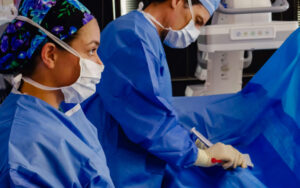While more and more women are developing fibroids in this country, more and more are also facing a delayed fibroids diagnosis. So, what's behind the epidemic of underdiagnosing this common condition? Well, a few different factors play a role.
First? Not every woman with fibroids develops symptoms. (In fact, 40 percent of fibroids cases are asymptomatic.) Then, if you experience disruptive symptoms? They could include issues like heavy periods; weight gain; constipation and pelvic pain. But those symptoms can also result from obesity, or a number of other common conditions. Plus, you might not know that they were abnormal if you'd lives with those symptoms for your entire adult life.
In short, these three factors--lack of awareness, lack of symptoms, or symptoms that overlap with other conditions, combine to delay a fibroids diagnosis for many women. As a result, up to 35% of women with fibroids put off seeking medical care until they've experienced major upheaval in their lives. So, to help fight back against these factors, we'll explore each one with a bit more depth.
First, let's figure out how you could possibly misinterpret your fibroid symptoms. That's what happened to Tina Mathias, a woman from Wales, who once weighed close to 340 pounds. At her heaviest weight, Tina was living with back aches and was often constipated. She even told her doctor about her symptoms. But she was told they were a result of her obesity.
Sadly, Tina believed her doctors, especially since she noted, "My periods were normal which is why I didn’t think it was a problem with my reproductive system." Hoping to find symptom relief, Tina lost weight--182 pounds, to be exact. Yet her symptoms stuck around. She was crushed.
“I’d lost so much weight and I thought I’d be healthier, but the pain in my lower back, sides and abdomen carried on,” she says. “Then it got so bad that I couldn’t get out of bed and I would wince if my husband touched me." And yet, Tina didn't ask for a second opinion, or try to dig deeper into the root cause of her symptoms. Exactly like Nkem Osian, whose story we'll hear next.

This Nigerian American woman lived for months with heavy periods, but told Verywell Health that she didn't go to the doctor since, "Talking about reproductive health was always taboo. Although I knew that my mother and sisters had experienced heavy periods, it wasn't something that we ever really discussed. So when my periods started changing in my late twenties, I felt like it was just part of being female."
Because she lacked awareness, Nkem waited a long time before asking for help with her symptoms. Even worse than her heavy periods? Nkem notes, "I was bleeding for two weeks at a time, sometimes with significant spotting in between cycles. There were many times when I would bleed through my clothes on the train from my home in New Jersey to my office in New York. It was humiliating, but what could I do? That was just my life."
Plus, throughout this time period, Nkem was dealing with period blood clots that were, "The size of my fist and very painful to pass." And even still, she didn't see her doctor. For what it's worth, we suggest telling your doctor about any clot that's larger than a quarter.) Yet, because Nkem didn't know that guideline, she says she had "A blood level not conducive to life" by the time she got medical attention.
Finally, Nkem's doctor could see she needed medical intervention. But not every woman is so fortunate. In fact, as we learned from a Fibroid Foundation survey, 37% of women had to visit at least three different doctors before receiving a fibroids diagnosis. Even more troubling? 15% of those women needed to see five doctors before fibroids were detected, seriously delaying both the fibroids diagnosis and the subsequent UFE treatments.
Like that 37% of unheard women, LaToya Dwight spent years dealing with undiagnosed fibroid symptoms. Every day contained fatigue, bloating, cramps, constipation or painful sex due to fibroids. And she told her OB-GYN of 12 years about her pain. Still, she didn't get screened for fibroids until she tried to remove her IUD, only to find it had been hidden by fibroids.
In some cases, a lack of fibroid awareness is the real problem. As it turns out, many women don't know that heavy periods are abnormal. Or, they know they've got a problem, but haven't ever heard about fibroids. For that reason, our Fibroid Doctors in Dallas support efforts like Fibroids Awareness Month that help women recognize the symptoms of uterine growths and seek earlier intervention. If we stick to these efforts, we hope more will get a timely fibroids diagnosis, followed by information on an array of treatment options.
After getting diagnosed with uterine fibroids, you may hear that a hysterectomy is your only treatment option. Luckily, that's just not the case. In fact, you've got many other options. And many are far less invasive than this complex and irreversible surgery.
There is, however, a catch. The longer you wait to treat your fibroids, the fewer the effective treatment options that will be available to you. So, to that end, we invite you to explore Uterine Fibroid Embolization, a minimally invasive treatment option, at our Dallas fibroid center. Schedule your consultation today!

Our Locations
Monday - Friday
8am - 5pm
Dallas
3920 W Wheatland Rd,
Suite 108,
Dallas, TX 75237
Plano
5425 W. Spring Creek Parkway,
Suite 100
Plano, TX 75024
Scheduling
Please contact our dedicated specialists to schedule a consultation today.
2025 Dallas Fibroid Center. All rights reserved. Website Design by Healthcare Success